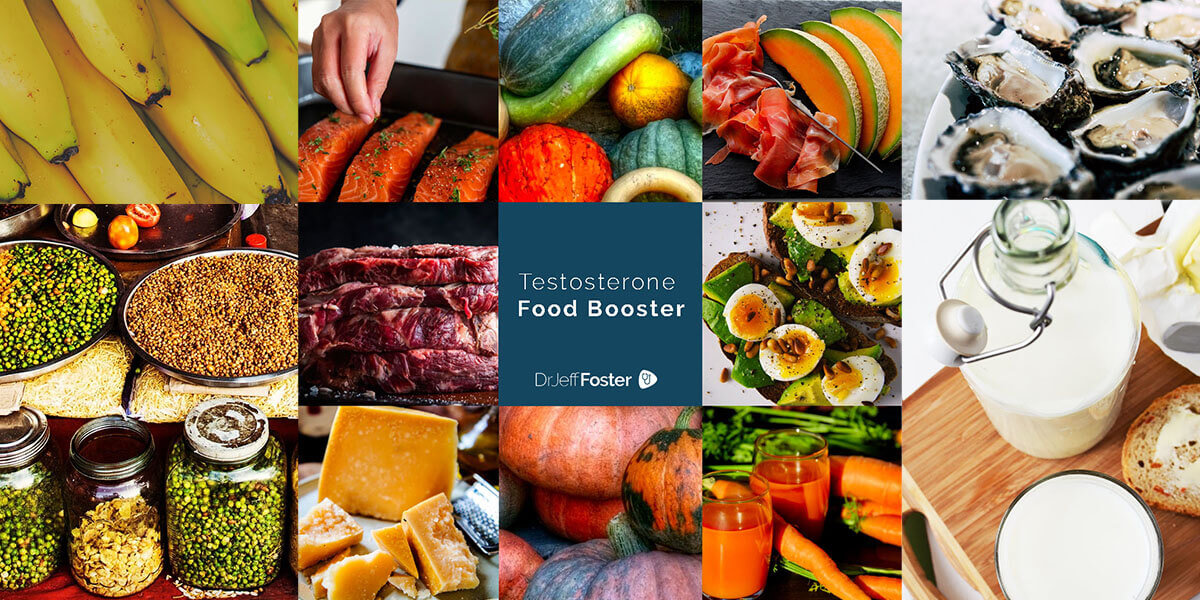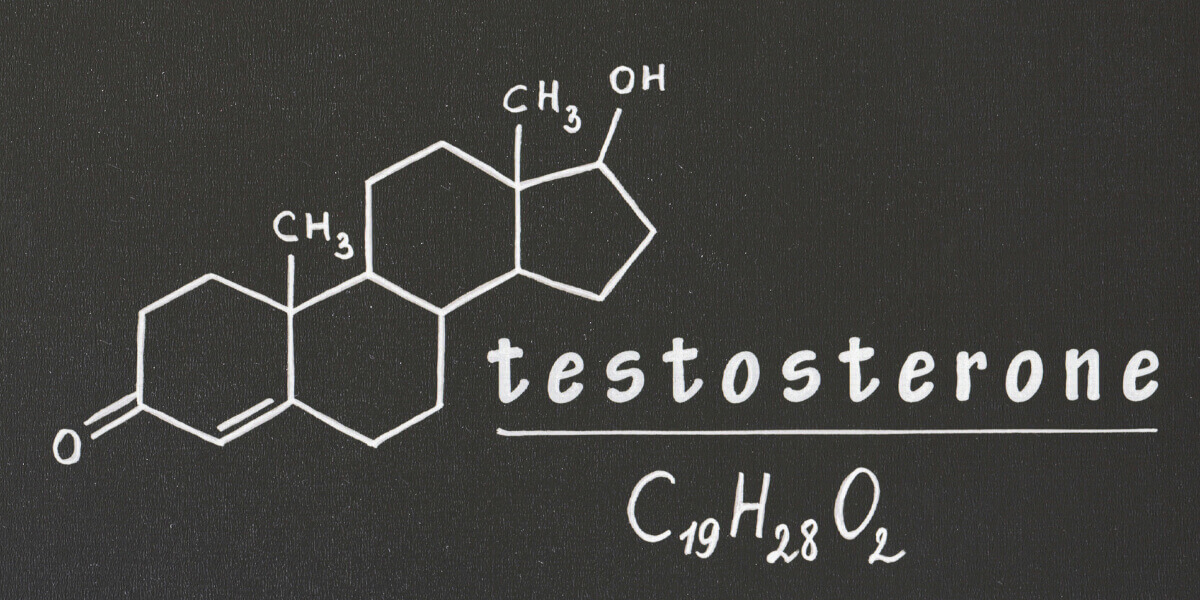Many things impact our health and bodily functions, including genetics, family history, and lifestyle choices. In most cases, multiple factors contribute to diseases and disorders such as low testosterone, but fortunately, good nutrition is a powerful component in reducing the risk. In the case of low testosterone, there is no magic bullet in food or supplement form that will directly result in boosting testosterone, however, there are many foods that will support the bodily functions required to produce a healthy supply.
The vast majority of men who are fit and healthy and enjoy a balanced diet (including plenty of fruit and vegetables) take regular exercise, and have good quality sleep may not need to think about boosting testosterone through diet. This is because a healthy body will only produce the required amount of testosterone and so even if they manipulate their diets they might not produce any extra supplies.
There are, however, three main groups that will benefit from utilising nutrition to support testosterone function, and the first is men who currently have a poor diet. The second is men with malabsorption issues such as Crohn’s, coeliac disease, or cystic fibrosis because conditions like these reduce the body’s ability to absorb nutrients normally. The final group are those that have a high need to maximise their testosterone production, such as professional athletes who, due to their exercise regimes, can produce more testosterone than those with a more sedentary lifestyle.
The key to good nutrition
It is important to note that before going to the supermarket and clearing the shelves of eggs, the key to good nutrition, no matter what the intended outcome, is to have balance. Another important factor is to regulate portion sizes in order to maintain a healthy weight, as obesity is a major factor in low testosterone. So, what nutrients, vitamins, and minerals do you need to support testosterone production and what foods can have the effect of boosting testosterone?
Zinc
If your testosterone levels are below the normal range, you may have a condition called hypogonadism. Hypogonadism can result from several treatable medical conditions so it is important to fully explore the cause with your GP, but in some cases, hypogonadism may be due to a nutritional deficiency in zinc. Zinc is an essential dietary mineral which is necessary for your immune system to function properly and plays a crucial role in cell division. Zinc helps enzymes break down food and other nutrients. It also plays an important role in enzymes that build proteins. It can be found in certain foods and is also available in supplement form. Our bodies do not store zinc so it is important to eat foods daily that contain it, including:
- Meat (this does come with its own issues though, as recent studies have shown that eating large amounts of red meat, especially processed meat, has been linked to an increased risk of heart disease and some cancers, so be conscious of portion size and avoid eating more than three portions a week).
- Shellfish (again, this comes with the caveat to be aware that shellfish contain heavy metals such as lead and mercury, so don’t overdo it; balance is everything!)
- Legumes like chickpeas, lentils, and beans
- Seeds such as hemp, flax, pumpkin, or squash seeds.
- Nuts, pine nuts, peanuts, cashews, and almonds
- Dairy (dairy can be high in fat so be cautious of portion size, as dietary fat is a contraindication for testosterone production)
- Eggs (unless you also have high cholesterol)
- Whole grains, wheat, quinoa, rice and oats
Magnesium
Magnesium is an essential mineral that cannot be made by the body itself, but we do store about 25 grams of it in bones, muscles and soft tissue. There is evidence that magnesium exerts a positive influence on anabolic hormonal status, including testosterone, in men. In fact, many studies have shown that magnesium supplementation supports increases in both free and total testosterone levels in men, boosting testosterone levels overall. Interestingly, one study revealed that men who exercise and take magnesium supplements see their free and total testosterone levels rise even more than men who just take magnesium supplements without exercising or men who just exercise without supplementing at all. So, what foods can you supplement to boost magnesium in your diet?
- Dark Chocolate
- Avocados
- Nuts particularly, cashews, almonds, and brazil nuts
- Legumes, particularly lentils, beans, chickpeas, peas, and soybeans
- Tofu, eaten in moderation
- Seeds such as flax, pumpkin, and chia seeds
- Whole grain cereals, including buckwheat, and quinoa
- Fatty fish, salmon, mackerel, and halibut
- Bananas
- Leafy greens like kale and spinach
Vitamin D
Vitamin D can be supplemented or absorbed from the sun’s UVB rays. Vitamin D is not water-soluble and we store it in our adipose fat tissues. Increasing your vitamin D stores may assist with boosting testosterone and improve other related health measures, such as sperm quality. One study found a close correlation between vitamin D deficiency and low testosterone. Ways to boost vitamin D through diet include:
- Oily fish
- Mushrooms
- Egg yolks
- Fortified foods, such as low-fat milk and cereals
Selenium
Selenium is an essential trace mineral that assists with cognitive function and fertility. We do not need a lot of selenium in our diets, but deficiency can cause problems. Selenium is stored in amino acids in our body, primarily in our major organs. Several studies have linked higher selenium intake to increased testosterone levels and improved sperm motility and quality.
Foods containing selenium include:
- Brazil nuts
- Seafood, including crab, salmon, tuna, and prawns
- White meat and poultry, like turkey and chicken
- Brown rice
- Lentils
- Vegetables such as peas and potatoes
The key factor to take from this is to eat a balanced diet and incorporate some or all of these foods in moderation. It is also important to note that certain foods will have a direct negative impact on testosterone production, these include a high alcohol intake. One study showed that having 1-2 drinks once or twice a week has very little impact on testosterone levels. However, five or more drinks in a two-hour period, whether occasionally or on a regular basis, has been shown to cause more severe health complications. These health concerns can include lower testosterone levels in men, and fertility issues in both men and women. Diets high in fat and carbohydrates can be problematic; carbohydrates, in particular, cause a spike in insulin, which often reduces testosterone.
If you think you have low testosterone, improving your diet, doing more exercise, and getting plenty of sleep will be beneficial. However, it is crucial that you have your levels tested and, if they are low, your GP will try to get to the root of the problem as in some cases low testosterone can be a symptom of other more serious conditions. Dr Jeff Foster offers a comprehensive men’s MOT health check and, whilst he is not a nutrition expert, he can help you treat your condition and offer ongoing support for lifestyle changes that may be required to get your levels back to normal.
About Dr Jeff Foster

A Men’s Health specialist and Medical Director and founder of H3 Health. I’m passionate about raising awareness of all aspects of Men’s Health, and heavily involved in both teaching and health promotion. I’m a committee member of the British Society of Sexual Medicine, and have been involved in writing the most recent national guidelines for testosterone deficiency in men.
Get in touch with Dr Jeff
If you are a prospective patient and wish to see Dr Jeff privately, then you can book an appointment via H3 Health (03309 120769 – National Rate). Alternatively if you are a member of the Media, then please use our contact form for media enquiries.







